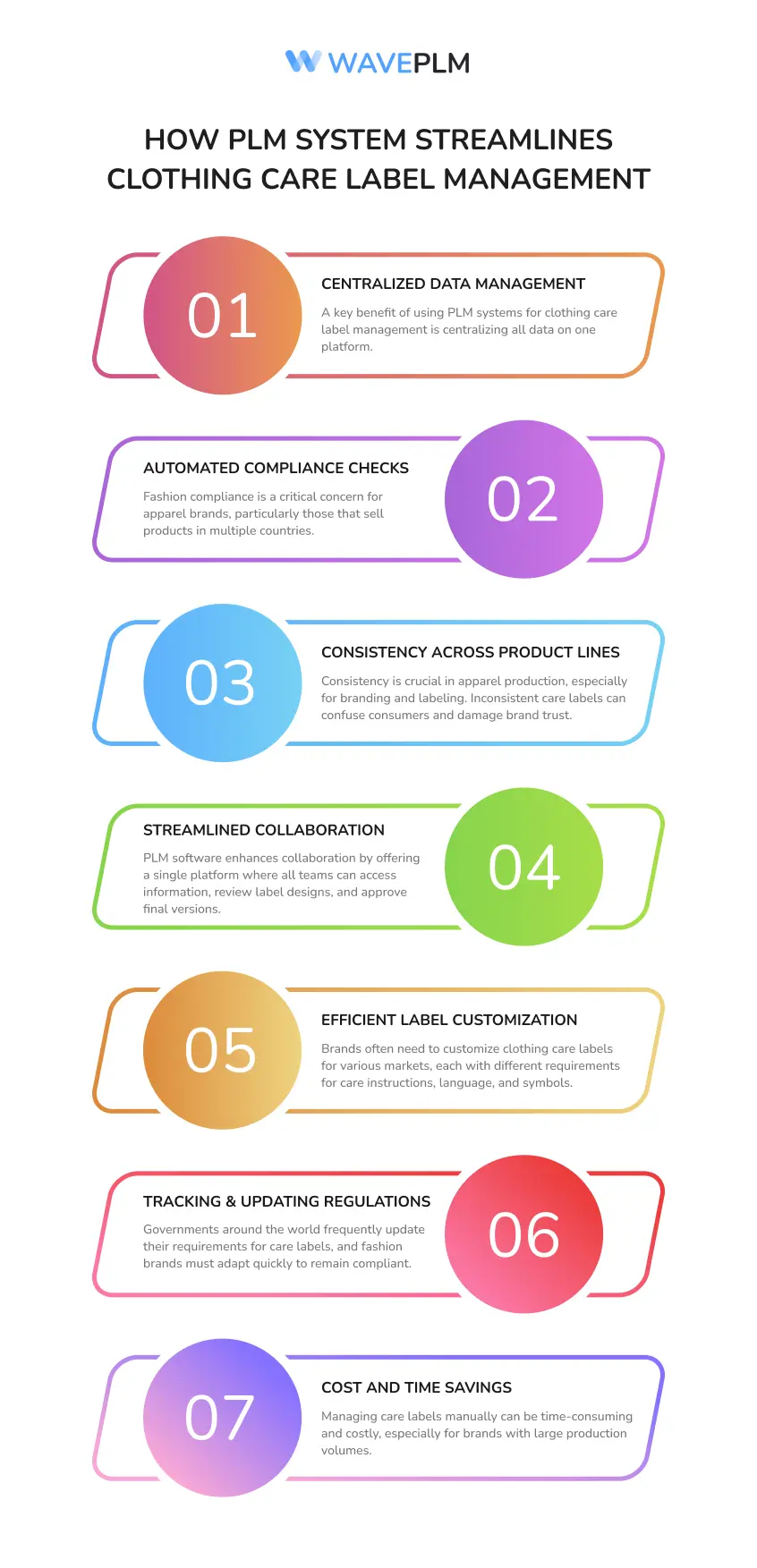
In the fast-paced fashion industry, where trends shift rapidly and production schedules are tight, managing every detail of garment creation is crucial. Often overlooked, clothing care labels are small but vital. They provide essential information for consumers and are key for meeting regulatory requirements.
Managing care labels can be time-consuming and prone to errors, especially for global fashion brands. This is where apparel software like Product Lifecycle Management (PLM) systems comes into play. PLM software has revolutionized many aspects of fashion production, including clothing care label management. By automating and streamlining this process, brands ensure regulatory compliance, boost efficiency and maintain consistency across their production lines.
Understanding Clothing Care Labels
In the previous article, we figured out what clothing care labels are and their types. Clothing care labels provide essential information to consumers about how to properly wash, dry, iron, and maintain garments. These labels contain symbols, instructions, and sometimes material information that ensures the longevity of the item while reducing the risk of damage. Care labels are not just helpful for consumers—they are required by law in many countries.
Fashion brands must comply with specific regulations when creating care labels. For example, in the United States, care labels must meet the standards set by the Federal Trade Commission (FTC), while the European Union has its own set of requirements. The complexity increases for brands that operate internationally, as they must navigate various local regulations to ensure their labels are legally compliant in every market.
The Role of PLM Software in Apparel Production
PLM software, which stands for Product Lifecycle Management, is a digital tool that helps companies manage every stage of a product’s life, from conception to manufacturing and retail. In the context of the fashion industry, PLM system is used to coordinate the design, development, sourcing, and production of garments. This includes managing materials, designs, specifications, and production schedules, all of which are essential for a streamlined and efficient production process.
When it comes to clothing care labels, fashion PLM software can automate the entire process, ensuring that brands are compliant with regulations and that their labels are consistent across all product lines.

How PLM System Streamlines Clothing Care Label Management
1. Centralized Data Management
A key benefit of using PLM systems for clothing care label management is centralizing all data on one platform. You can store and access washing instructions, material details, and country-specific compliance requirements in a single system. This reduces errors, keeps all team members updated, and enables smooth collaboration across departments.
Centralized data management also simplifies the process of updating care labels when regulations change. Instead of manually adjusting labels for each product, brands can make changes in the fashion PLM, and the updates will automatically apply across all relevant garments.
2. Automated Compliance Checks
Fashion compliance is a critical concern for apparel brands, particularly those that sell products in multiple countries. Each country has its own regulations regarding clothing care labels, and non-compliance can result in fines, delays in product launches, or even recalls. Keeping track of these regulations can be overwhelming, especially as they are subject to frequent updates.
Apparel management software like PLM helps brands stay compliant by automating compliance checks. The software can be programmed to monitor country-specific regulations and ensure that each care label meets the necessary standards. If a product is being sold in multiple markets, the PLM system can generate care labels that comply with the requirements of each country, eliminating the need for manual oversight.
3. Consistency Across Product Lines
Consistency is crucial in apparel production, particularly for branding and labeling. Inconsistent care labels can confuse consumers and damage brand trust. PLM software ensures consistency by standardizing label formats and information. It stores approved label templates and care instructions, which can be easily applied to multiple products with just a few clicks.
For example, if a brand uses specific symbols to indicate washing instructions, these symbols can be stored in the PLM system and automatically applied to new garments. This ensures that all care labels are uniform and aligned with the brand’s standards.
4. Streamlined Collaboration
Creating clothing care labels typically involves design, production, and legal teams. In traditional workflows, these teams often work in silos, causing miscommunication and delays. PLM software enhances collaboration by offering a single platform where all teams can access information, review label designs, and approve final versions.
By streamlining communication, fashion PLM reduces the likelihood of errors and ensures that care labels are approved and ready for production on time. This not only saves time but also minimizes the risk of costly mistakes.
5. Efficient Label Customization for Different Markets
Global apparel brands frequently need to customize clothing care labels for various markets, each with different requirements for care instructions, language, and symbols. Manually creating and managing these labels can be time-consuming and error-prone.
Apparel PLM simplifies this by enabling brands to create one care label template and customize it for different markets. The software automatically adjusts language, symbols, and other details according to each market’s regulations, ensuring accurate labeling for each garment without manual intervention.
6. Tracking and Updating Regulations
One of the challenges in clothing care label management is keeping up with ever-changing regulations. Governments around the world frequently update their requirements for care labels, and fashion brands must adapt quickly to remain compliant.
PLM helps brands stay on top of these changes by tracking regulatory updates and automatically alerting teams when updates are required. The system can store historical data on regulatory changes, making it easy to review past compliance efforts and adjust as needed. By automating this process, brands can ensure that they are always up to date with the latest regulations, avoiding potential legal issues.
7. Cost and Time Savings
Managing care labels manually can be time-consuming and costly, especially for brands with large production volumes. The traditional method involves designers, production teams, and legal experts reviewing each label, which can cause delays in production.
Automating care label management with PLM software significantly cuts time and costs. The software removes the need for manual checks and approvals, streamlines label creation, and ensures accuracy and compliance from the start. This leads to faster production, fewer errors, and cost savings for the brand.
Conclusion
Clothing care label management is crucial in apparel production, though it often goes unnoticed. It ensures product quality, consumer satisfaction, and regulatory compliance. For fashion brands, especially those operating globally, managing care labels manually can be challenging and prone to errors.
PLM software offers a powerful solution by automating and streamlining the creation, management, and customization of clothing care labels. By centralizing data, automating compliance checks, ensuring consistency, and facilitating collaboration, PLM systems help fashion brands save time, reduce costs, and avoid compliance issues. As the fashion industry continues to evolve, adopting PLM software for care label management will become an essential strategy for brands looking to stay competitive and efficient.
In the end, embracing PLM software for clothing care label management allows brands to focus on what truly matters: creating quality products and delivering them to consumers with confidence.





Leave a Reply